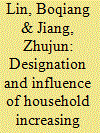| Srl | Item |
| 1 |
ID:
111411


|
|
|
|
|
| Publication |
2012.
|
| Summary/Abstract |
Electricity is the guarantee of normal life, and the electricity price is widely concerned. As a developing country in the transition stage, abundant policy implications are included in the electricity price in China, thus, whether to adjust the resident electricity price is a dilemma for the government. However, the current single tariff system cannot cope with the complex social and environmental problems. A new price mechanism is indeed needed. This paper tries to design an increasing block tariffs system with the consideration of residential income and electricity consumption. The result indicates that the increasing block tariffs system with four-tier structure is more reasonable for China. Although the increasing block tariffs will result in the increase of electricity price, it is still acceptable and affordable. The increasing block tariffs will greatly improve the equity and efficiency, and promote the electricity saving and emissions reduction. Moreover, the power companies will increase tariffs revenue, which would use to the transmission networks investment in poor area. In order to the offset the limitations of the increasing block tariffs, the government should adopt some complementary measures.
|
|
|
|
|
|
|
|
|
|
|
|
|
|
|
|
| 2 |
ID:
115186


|
|
|
|
|
| Publication |
2012.
|
| Summary/Abstract |
The three-tier inclining block tariff ("IBT") issued by the Chinese government in 2010 is focusing attention of energy economists, among whom Lin and Jiang (2012. Designation and influence of household increasing block electricity tariffs in China. Energy Policy 42, 164-173) who assert that the issued tariff is unsuited to meet the social and environmental objectives it was designed for. These authors offer an alternative four-tiered IBT, the performance of which they show by evaluating its welfare and income distribution effects taking the current uniform tariff as reference. To measure the surplus loss to a representative household in a given block the authors use the trapezoid approach. But, because of the limited data on demand, they calculate the household's response by using a constant point estimate of the own-price elasticity of electricity demand. In this note I show there is an incompatibility between these two modeling assumptions. Combining them is causing an upward bias in the surplus loss, which is of significance given the large price change associated with the IBT. I then offer a correction to this bias.
|
|
|
|
|
|
|
|
|
|
|
|
|
|
|
|